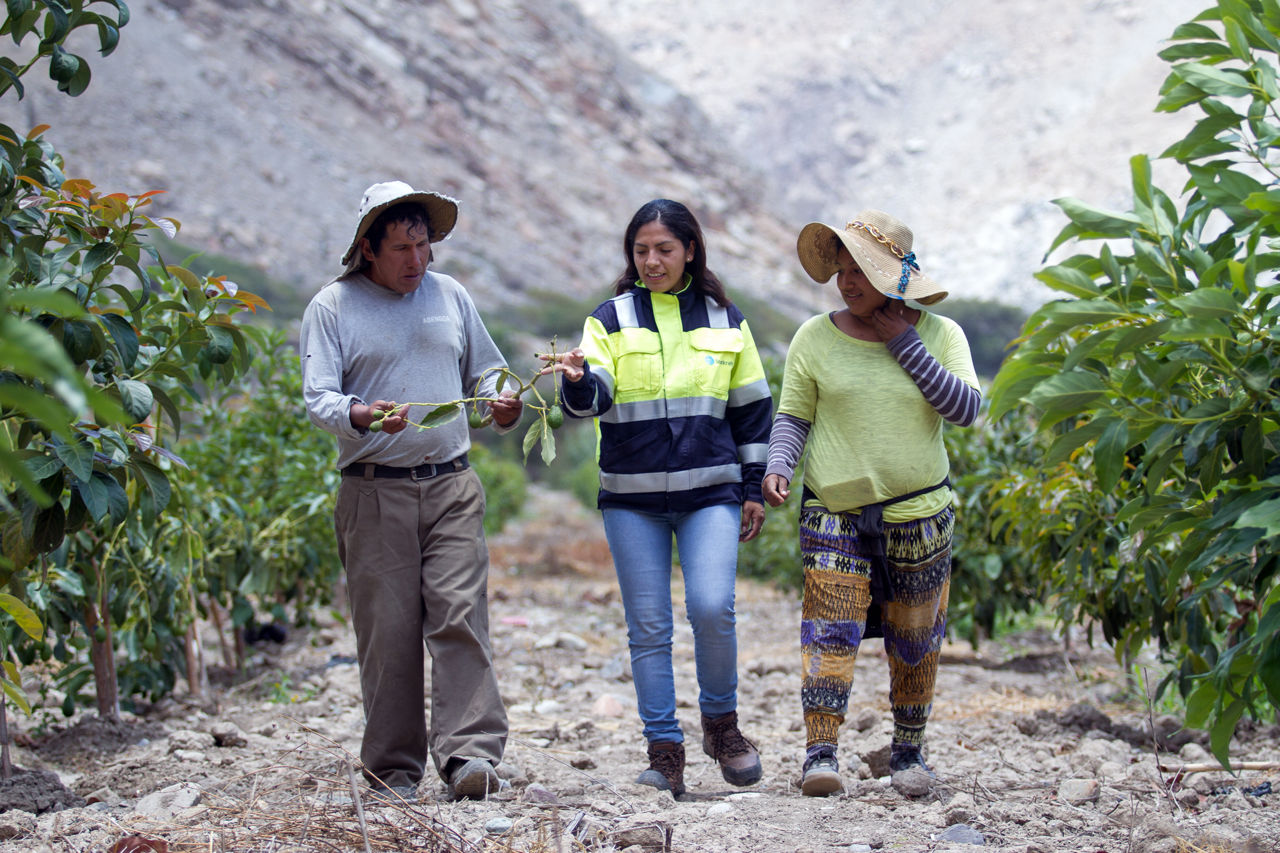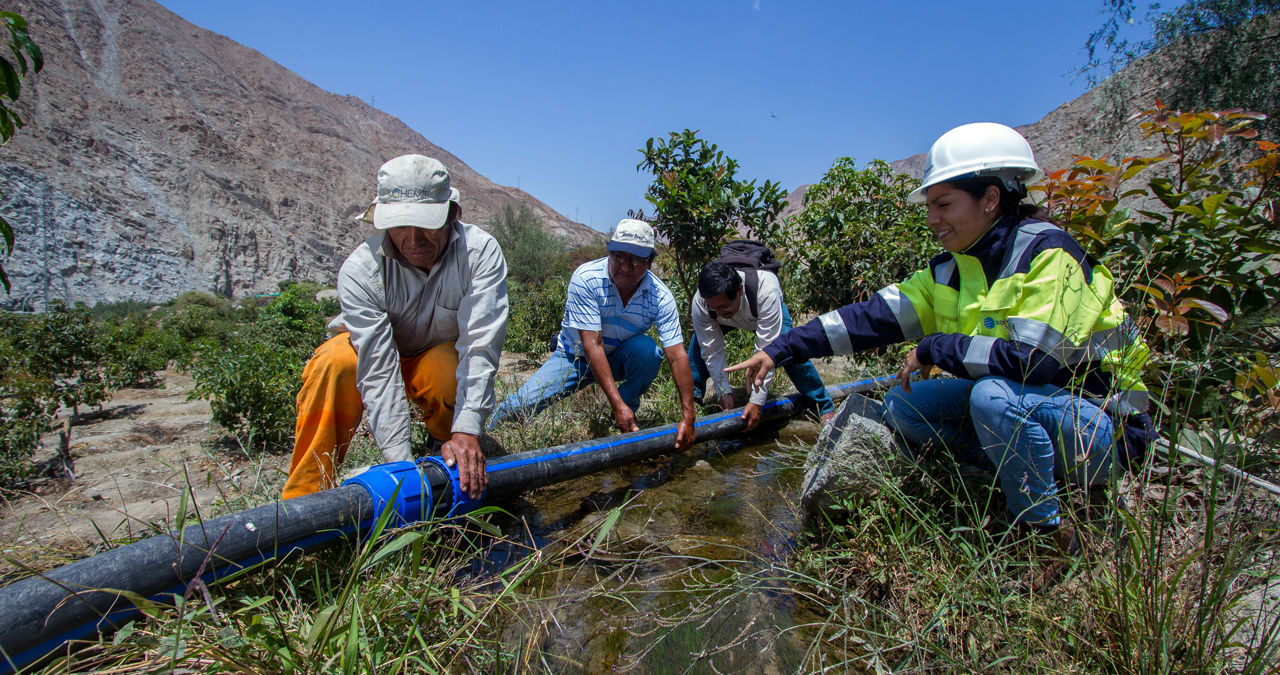Countries

Fruit growing requires watering in dry areas in the shade of Peru's high mountains. Statkraft has helped to install irrigation systems at areas with fruit trees near the company's hydropower plants, such as here at the village of Quintay.
Social responsibility: Life-giving water in Peru
In the South American republic of Peru, Statkraft is helping to strengthen livelihoods in rural areas by ensuring access to water and improving irrigation systems in the fields.

Frank Loli is responsible for corporate social responsibility at Statkraft Peru.
Abundant crops of avocados, cherimoya and other fruits are essential to sustain the livelihoods of villagers throughout rural Peru. But if the crops are to grow and return year after year, a steady supply of water is crucial.
It may sound simple, but ensuring good access to those life-giving drops can be a complicated process in a country where many rural communities endure severe water scarcity.
"Yes, we need to water our fields," says Enedina Claros Simbrón, and shows us the aromatic fruit cherimoya which was originally grown by the Inca people in Peru and Ecuador, but which today has found its way to other parts of the world.

The 52-year-old from Huácar in the Ambo province of Peru is one of many hundreds of villagers who have benefited from Statkraft's efforts to ensure that farmers have access to water resources in the areas where the company has hydropower plants.
Enedina Claros Simbrón lives near Statkraft's Pichupampa Reservoir. For her and her neighbours, good fruit crops are essential to making a living. The key is a steady supply of water to the fields where the fruit is grown.
In the villages of Cahua, Tongos, Quintay and Huácar, Statkraft is actively involved in the important community work involving water supply. Two of Statkraft Peru's nine hydropower plants are located here.

The fruit growers around Statkraft's hydropower plant in Quintay appreciated the company's contribution to bringing water to the fruit fields, confirms Bety Luis (middle of the photo), social coordinator at Statkraft Peru.
When water is a valuable commodity…
No matter where in the world Statkraft operates, the company is governed by strong sustainability principles aimed at improving livelihoods in local communities as a result of Statkraft's presence.
In Peru, the company mapped out the most pressing challenges for rural communities and identified what resources and expertise the company could contribute to remedy the problems.
It soon became clear that this involved better irrigation and access to a water resource which the fruit farmers found to be extremely limited.
"Historically, the villages around our facilities have suffered from poor and inefficient irrigation systems that have made it difficult to carry sufficient water to the local orchards. On top of that, climate change has made water a more valuable commodity, and water loss can be critical. This combination has resulted in a limited amount of land being used for agricultural purposes in these communities, which in turn has resulted in low income levels for the inhabitants," explains Frank Loli, head of corporate social responsibility in Statkraft Peru.
In 2018, Statkraft launched a project to install modern irrigation infrastructure in four districts where the company operates. In the autumn of 2021, work was still in progress to start up all the irrigation systems, but the goal was to be completed by the end of the year. The areas where the irrigation systems have started up are already showing positive results in the form of improved crop yields.

Diligent hands helped dig ditches for water pipes to irrigate areas with fruit trees in Quintai near one of Statkraft's hydropower plants in Peru.
Proper watering, larger crop yields
"In the Tongos community, we see that the improvements to the water transport system have increased irrigation efficiency from 30 to 90 per cent. This means that much less water is lost on the way to the crops than before," says Loli.
In Tongos, Statkraft completed the first construction phase for an irrigation system in an area of 20 hectares in 2018–2019, and a nearby area of another 10 hectares will also be connected.
In Quintay, Statkraft has built a 700-cubic-metre geomembrane reservoir to ensure consistent drip irrigation for local avocado crops.
In Huácar, Statkraft took on responsibility for improving an existing irrigation canal and its intake. The facility will supply water to an area of land measuring 60 hectares.
In Cahua, a drip irrigation system is at an early stage of development and currently covers an agricultural area of around four hectares.
The supply of water has resulted in better fruit yields everywhere. But it’s not just a matter of having a large amount of water; having the right amount is equally important. And no water should be lost or wasted.

Important social measures
By introducing and supporting the use of water-saving technologies and controlled irrigation, Statkraft hopes to help strengthen the livelihoods of hundreds of households.
Enedina Claros Simbrón represents one of those households, and she has already seen how a more efficient water supply makes a difference.
"Now there is even surplus water for new fields where we can water our avocado, cherimoya and peach trees. Now we have enough products to sell in the markets in Lima!"
Water is thus not only the elixir of life; it is also the source of a brighter future for many residents in the rural communities around Statkraft's many hydropower plants in Peru.
"Through this form of community effort, we contribute to higher crop quality and increased income for the fruit growers in the local communities in our immediate vicinity," says Frank Loli.
To operate responsibly
Statkraft's commitment to responsible business conduct is set out in the company's code of conduct. The company and its employees strive to live up to the vision of "adding value to the communities in which we operate".
Creating shared value with the communities where Statkraft operates is a win–win strategy that benefits the company, its production facilities and neighbouring communities.
The commitment to corporate social responsibility is well represented through the work undertaken for the benefit of the rural communities in Cahua, Tongos, Quintay and Huácar in Peru, says Orlando San Martin, senior advisor in sustainability and the environment at Statkraft's headquarters in Oslo.
"By improving irrigation systems in areas with water scarcity near our power plants, we contribute to sustainable management and efficient use of natural resources, while promoting local economic growth, creating employment opportunities for men and women, supporting entrepreneurship and innovation, and strengthening local communities' technological capacity and ability to move towards more sustainable production patterns," he says.
"In addition to supporting local communities through such initiatives, we also contribute to the global development agenda, represented by the UN's sustainability development goals. In the case of our social activities in Peru, these are contributions to SDG 8 'Decent work and economic growth' and SDG 12 'Responsible consumption and production'," San Martin points out.

Facts about Peru
-
Population: 33 million
-
Capital: Lima
-
Government: Republic
-
President: Pedro Castillo
-
Languages: Spanish and various indigenous languages
Statkraft in Peru
Statkraft has nine hydropower plants in six regions of Peru. The plants have a total power output of 450 MW and produce around 2 500 GWh annually, enough to supply more than 1.8 million Peruvian households with 100 per cent renewable energy.
In 2003, SN Power acquired the company Cahua, which operated the Cahua, Pariac, Gallito Ciego and Arcata hydropower plants in Peru. Five years later, Cahua merged with the company Electroandes, which operated the four hydropower plants Malpaso, Yaupi, Pachachaca and La Oroya.
SN Power was at that time owned by Statkraft and Norfund, the Norwegian state's investment fund for developing countries. In 2017, Norfund took over the entire ownership interest in SN Power in an asset swap agreement whereby Statkraft acquired SN Power's power plants in Peru, Brazil, Chile and India, as well as a cash sum.
The Cheves run-of-river power plant in the highlands of the capital Lima is the first to be developed and built by Statkraft Peru from scratch. The plant began operation in 2015.
In the areas of Peru where Statkraft has power plants, the company's corporate social responsibility projects have contributed to 53 local communities and more than 30 000 recipients.


"The commitment to corporate social responsibility is well represented through the work undertaken for the benefit of the rural communities in Cahua, Tongos, Quintay and Huácar in Peru."

Sustainability and social responsibility
Statkraft's ambition is to contribute to a more sustainable future by delivering renewable energy to businesses, local communities and homes around the world. An important part of the work for sustainability is measures for societal development in the countries where the company has operations.
Learn more about sustainability and social responsibility

























